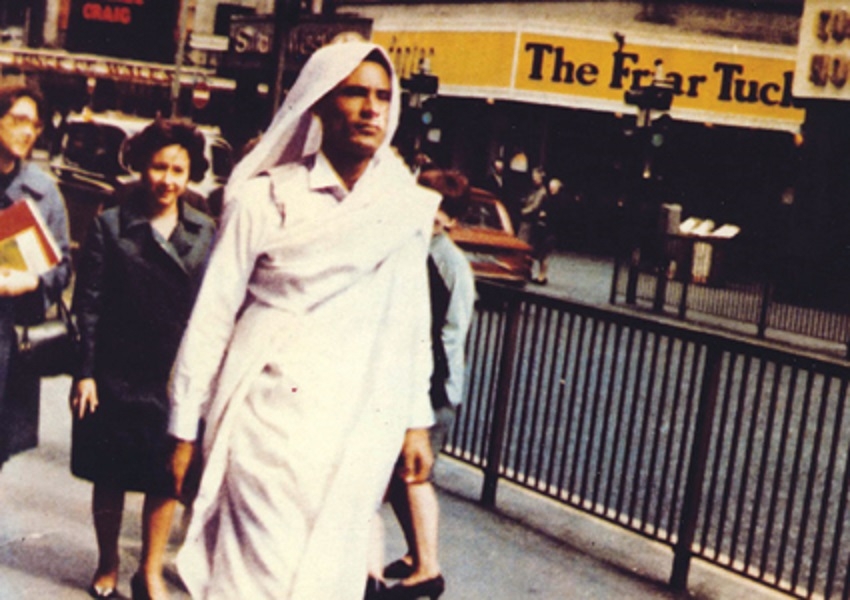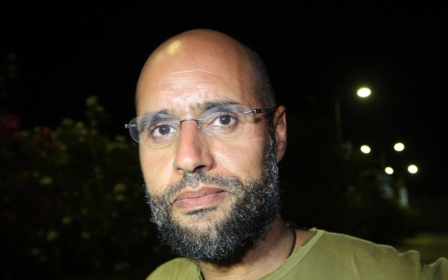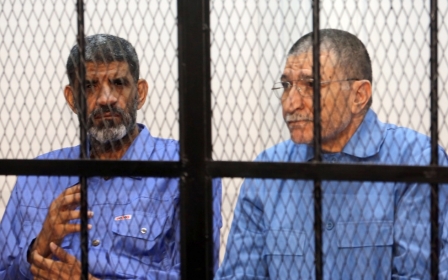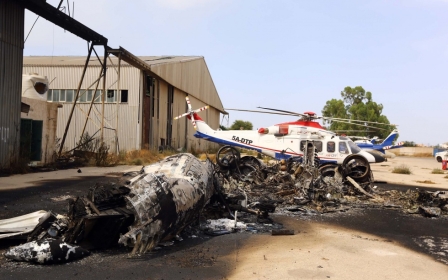Gaddafi play comes to an untimely end
Performance addressed hidden agendas and corruption surrounding the overthrow and assassination of Libyan president, but was inexplicably shut down

Libyan revolutionary Muammar al-Gaddafi in Piccadilly, London during 1966 (Wikicommons)
Published date: Jeudi 12 février 2015 - 17:15
|
Last update: 9 années 9 mois ago
Represenentatives are yet to clarify exactly why the play Interview with Gaddafi was withdrawn from London’s Waterloo East Theatre last month.
The play was scheduled to run 3 June-29 June, but the last performance took place on 15 June.
On its website, the theatre announced: “Due to unforeseen circumstances, the writer and producer of the above show, have decided to end the run of this production early, with the last performance having taken place on Sunday, 15 June. Waterloo East Theatre is disappointed that this decision has been taken and will be in touch with all the advance ticket holders to arrange refunds in due course.”
When contacted by Middle East Eye, the box office spokesman said, “There was a legal issue and the producer decided not to continue with it.”
He would not elaborate on the nature of the legal issue and playwright Reggie Adams could not be contacted for comment.
Also a journalist and political campaigner Reggie Adams used his play Interview with Gaddafi to question the way international events are portrayed by the Western media.
He is a man with a mission: “The idea of this play is to take a political situation that we all saw unfold and then shine the light on the elements that we don't normally get to see, where there has been political manipulation of the mainstream narrative, where there are underlying hidden commercial factors at work and where there are issues of global importance that we are not having a conversation about, such as our notion of democracy or the global money system or the structure of the UN and more. I'm hoping that this play will open up conversation and debate, or at least heighten the awareness for the audience the next time they turn on the news.”
The play began with an insight into one of the never ending dilemmas of a journalist: how to balance his ideals with the need to make a living. “Go and do your job and get the money,” Eva the wife of the struggling international correspondent Bellamy Johan yelled as the play opened.
But Bellamy found it difficult to adapt to the mainstream journalism of today: “It makes me sick ... just sensationalising every story to get people interested in reading nonsense. For me a journalist is up there with the philosophers and the historians, responsible for feeding the minds of people and giving insights, inspiring ideas, motivating civilisation to progress to new heights.”
The playwright made excellent use of modern technology. Bellamy’s children and editor appeared through Skype. His daughters were asking for money in endless Skype calls and the editor berated Bellamy for not coming up with a story. His wife had thrown him out of the house but his Libyan neighbour, Eric, appeared as a life-saver with a suggestion that he goes to Libya.
Exposing the superficiality of media reports, Eric asked perceptively, “Why do we know so much about Gaddafi’s costume and nothing about his politics? He prattled on for an hour at the UN, but you did not convey his point. Go and get the real story.”
Bellamy flies to Tripoli on a plane full of businessmen. He was the only journalist. In Libya the life-saving scoop, the interview with Gaddafi materialised more by good luck than good management.
Although the disclaimer at the beginning of the play stated that it is a work of fiction, the interview was a partial replay of one of Gaddafi’s final interviews. Bellamy spoke with the voice of the West and Gaddafi answered in a confident, forthright manner illustrating two totally different perspectives of reality. Which is true? Or does reality depend on the perspective from which it is viewed?
Once again, Bellamy was the hero. He was in his heyday when he interviewed Castro. He returned to his hotel and drank with an American World Bank representative who offered a penetrating flash of insight into why the West was determined to destroy Gaddafi.
“This f--wit was the head of the African Union and he wanted to kick the World Bank and IMF out of this continent. They could have switched the balance of economic power over night - it would have been Europe that wouldn’t have been able to feed itself, they import 40 percent of their food, almost half of that from Africa. It’s all about food, minerals, diamonds, gold, about ownership about control and most of all about money!”
As the NATO bombing intensified and Gaddafi’s Libya crumbled, Gaddafi gave Bellamy another interview, describing the takeover of his country by commercial interests. But the editor didn’t want to know: “Are you kidding me? The war is over, he lost, Nato’s just been bombing the f--k out of the country and you wanna change the angle of the story now.”
Bellamy’s protest that “they don’t know the real story” got him fired from mainstream journalism. But the new media rose to the occasion, his final interview with Gaddafi was uploaded on his blog by his children and was seen by millions.
Interview with Gaddafi is a classic five-act play with drama, political message and entertainment. A cast of just four stage actors who play multiple roles interact with an above stage screen with a further three actors contacted by Skype.
It is tempting to assume that Adams used Gaddafi’s last speech to express his own views about the global financial system. He's the author of Now Utopia, a work on political philosophy and macro-economics, which has become the manifesto for the UK's Humanist Party.
Lindsay Fulcher, a journalist who visited Libya three times when Gaddafi was in power commented: “It's refreshing to hear the other side of the story. Reggie Adams's play is a brave piece of writing. He's not afraid to go against the flow - and what a flow it is - a tidal wave of murder, money and manipulation that shows no sign of abating."
Middle East Eye propose une couverture et une analyse indépendantes et incomparables du Moyen-Orient, de l’Afrique du Nord et d’autres régions du monde. Pour en savoir plus sur la reprise de ce contenu et les frais qui s’appliquent, veuillez remplir ce formulaire [en anglais]. Pour en savoir plus sur MEE, cliquez ici [en anglais].




